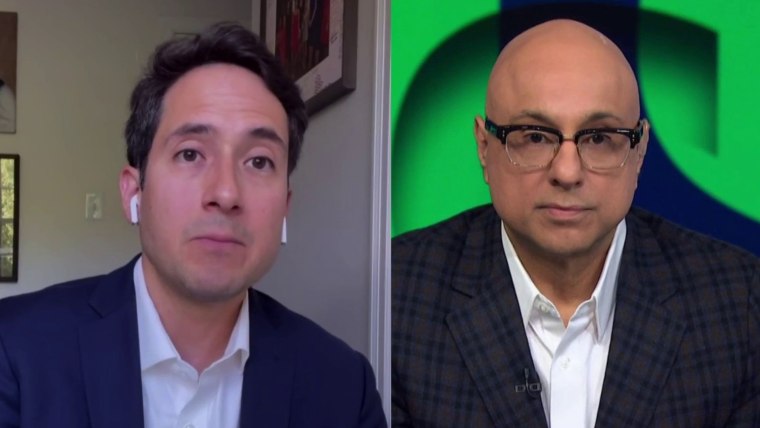This is an adapted excerpt from the Sept. 28 episode of “Velshi.”
Recently, you may have heard a number of stories involving the Federal Trade Commission, or FTC. It’s a 110-year-old independent, bipartisan government agency tasked with protecting consumers and ensuring a strong, competitive marketplace.
It has five commissioners, all nominated by the president to serve seven-year terms, and no more than three of those five can be from the same political party at any given time. It’s designed to be bipartisan and independent.
The commissioners draft rules, conduct investigations and bring about enforcement actions, often focusing on noncriminal antitrust laws. Under the leadership of Democrats and Republicans, the FTC has challenged major companies over the years, including Facebook (now known as Meta) fining it $5 billion for privacy violations on social media; Volkswagen for false emissions claims made about its vehicles; and Amazon, accusing it of maintaining an illegal monopoly on e-commerce.
Ferguson has said he wants to “vigorously enforce antitrust laws” but he’s also said he wants to target “DEI collusion.”
In fact, in a separate lawsuit last week, Amazon reached a massive $2.5 billion settlement with the FTC, resolving allegations that the e-commerce giant tricked customers into signing up for its Prime memberships and purposefully made it difficult to cancel. Amazon admitted no wrongdoing as part of the deal.
While that FTC settlement is historic, it’s not the most important story involving the body recently. But in order to get some proper context, we have to rewind back to March, when Donald Trump summarily fired the two Democratic commissioners, Alvero Bedoya and Rebecca Kelly Slaughter. Both initially sued to reverse the firings, though Bedoya has since stepped down. The three Republican commissioners all remain in place.
In July, a federal judge ruled that Slaughter’s removal was illegal, citing the 1935 Supreme Court decision Humphrey’s Executor v. United States. That 90-year-old unanimous Supreme Court decision had upheld statutes passed by Congress to limit the president’s power to fire independent agency members, declaring they could only be removed for misconduct, not policy differences.
Trump is looking to upend that 90-year precedent, and last week, he got one step closer when the Supreme Court agreed to hear the case in December. In announcing they would hear the case, the 6-3 conservative supermajority also overturned that federal judge’s ruling, allowing Slaughter’s firing while litigation continues.
In her dissenting opinion, the liberal Justice Elena Kagan wrote of Trump, “He may now remove — so says the majority, though Congress said differently — any member he wishes, for any reason or no reason at all. And he may thereby extinguish the agencies’ bipartisanship and independence.”
The FTC, along with the Department of Justice, reviews corporate mergers and acquisitions and launches investigations and lawsuits against companies. If Trump succeeds in weaponizing the FTC, he could wield that power and pressure businesses to bend to his will.
In that case, we ought to take a look at who was promoted by Trump to chair the FTC, Republican Andrew Ferguson. Ferguson has said he wants to “vigorously enforce antitrust laws,” but he’s also said he wants to target “DEI collusion” and crack down on the tech industry for allegedly censoring conservative viewpoints on social media platforms.
On Friday, Bedoya, one of the two Democratic commissioners fired by the president, told the co-hosts of “The Weeknight” that we’ve already seen how Trump uses supposedly independent agencies to carry out his agenda, referencing Federal Communications Commission head Brendan Carr’s involvement in the Jimmy Kimmel suspension.
Bedoya warned that “every time one company acquires another, it’s going to give people like the chairman of the FCC, or the leaders at the FTC and elsewhere, hooks that this administration can come in for their pound of flesh.”

